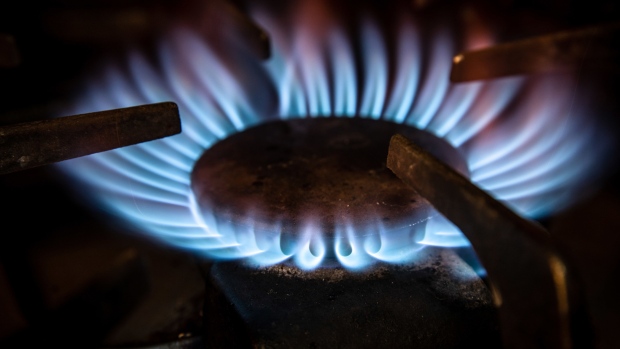Sep 12, 2022
European Gas Slumps as Bloc Prepares Details for Intervention
, Bloomberg News

(Bloomberg) -- Natural gas prices fell as the European Union started outlining details of its intervention into an unprecedented energy crisis, including a proposal for targets to reduce electricity demand. Power prices also slumped.
Benchmark gas futures declined as much as 9.3% to the lowest in a month. Still, prices remain almost eight times higher than normal for the time of year. Goldman Sachs Group Inc. expects they will halve from current levels sometime in the first quarter of 2023.
The EU is seeking to curb power consumption and provide liquidity to energy markets as it seeks to prevent the crisis from engulfing the broader economy. While Russia has reduced supplies, the bloc is hoarding gas and trying to diversify its fuel sources as winter approaches.
Why Europe Wants to Change the Way Power Gets Priced: QuickTake
The European Commission, the EU’s executive arm, will propose two targets on power demand reduction: an objective to cut overall consumption and a mandatory goal on lowering demand during selected peak hours, according to a draft regulation seen by Bloomberg News.
It will also aim to cap excessive revenues of companies producing power from sources other than gas, through a limit on the price of electricity generated from technologies such as renewables, lignite or nuclear energy. All changes need to be signed off by member states.
“We are seeing a major energy crisis -- but I still don’t see this being translated into facts in terms of energy demand reduction in our daily lives,” Anne-Sophie Corbeau, a research scholar at the Center on Global Energy Policy at Columbia University who previously worked for British oil major BP Plc. “We have a gas and power crisis. So it is important to reduce gas and power demand.”
Gas accounts for about 20% of EU generation, and gas-fired generation has been increasing year-on-year over the first eight months of 2022 rather than decreasing, due to lower hydro and nuclear power, she said.
At a meeting of the bloc’s energy ministers on Friday, the member states, all with varied energy needs, were divided on how to implement price caps for gas. The idea of a broader price cap -- on all gas imports, not just shipments from Russia -- was discussed, but the ministers agreed more work on the measure is needed.
Norway, a key supplier of gas to Europe, is “skeptical” about introducing a price cap, Prime Minister Jonas Gahr Store said after a call with Commission President Ursula von der Leyen. “A maximum price will not do anything about the fundamental problem, namely that there is too little gas in Europe,” Store said.
Read: Europe to Pay ‘Obscene’ Natural Gas Prices in Short Term: Souki
Goldman Sachs said it expects high inventory levels at the start of the winter season “to accommodate larger-than-average storage withdrawals, still leaving them over 20% full” by the end of March.
“This in our view will set the stage for the sense of urgency to destroy demand we see currently to be gradually replaced by a sense of market relief for having made it through winter,” analysts including Samantha Dart said in a note. The bank expects benchmark prices to fall below 100 euros per megawatt-hours in the first quarter.
European storage sites are about 84% full, slightly above five-year average, according to Gas Infrastructure Europe. The region is also adding more facilities to receive liquefied natural gas, with the latest terminal opened in the Netherlands last week.
New Gas Terminals Arrive to Ease Putin’s Grip on EU Energy
European LNG imports are expected to be up 16% versus last winter, as new projects in the US and Mozambique start up, Goldman Sachs said. Still, a cold winter in Asia and an economic rebound in China could boost that region’s competition for cargoes.
Front-month Dutch futures closed 7.9% lower at 190.59 euros per megawatt-hour in Amsterdam. The UK equivalent declined by 8.1%. Benchmark German power for next year traded 9.1% lower.
There’s still major “uncertainty on the price of gas, and beyond the price of gas -- the availability of gas,” Gilles Moec, chief economist at AXA Investment Managers, said in a Bloomberg TV interview. The market is still awaiting details on the EU’s further moves, and if there’s a need for actual gas and power rationing, he said.
©2022 Bloomberg L.P.






